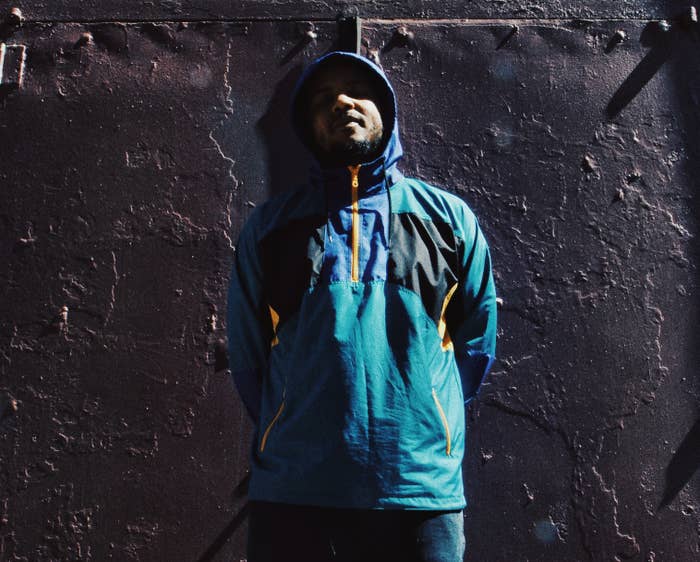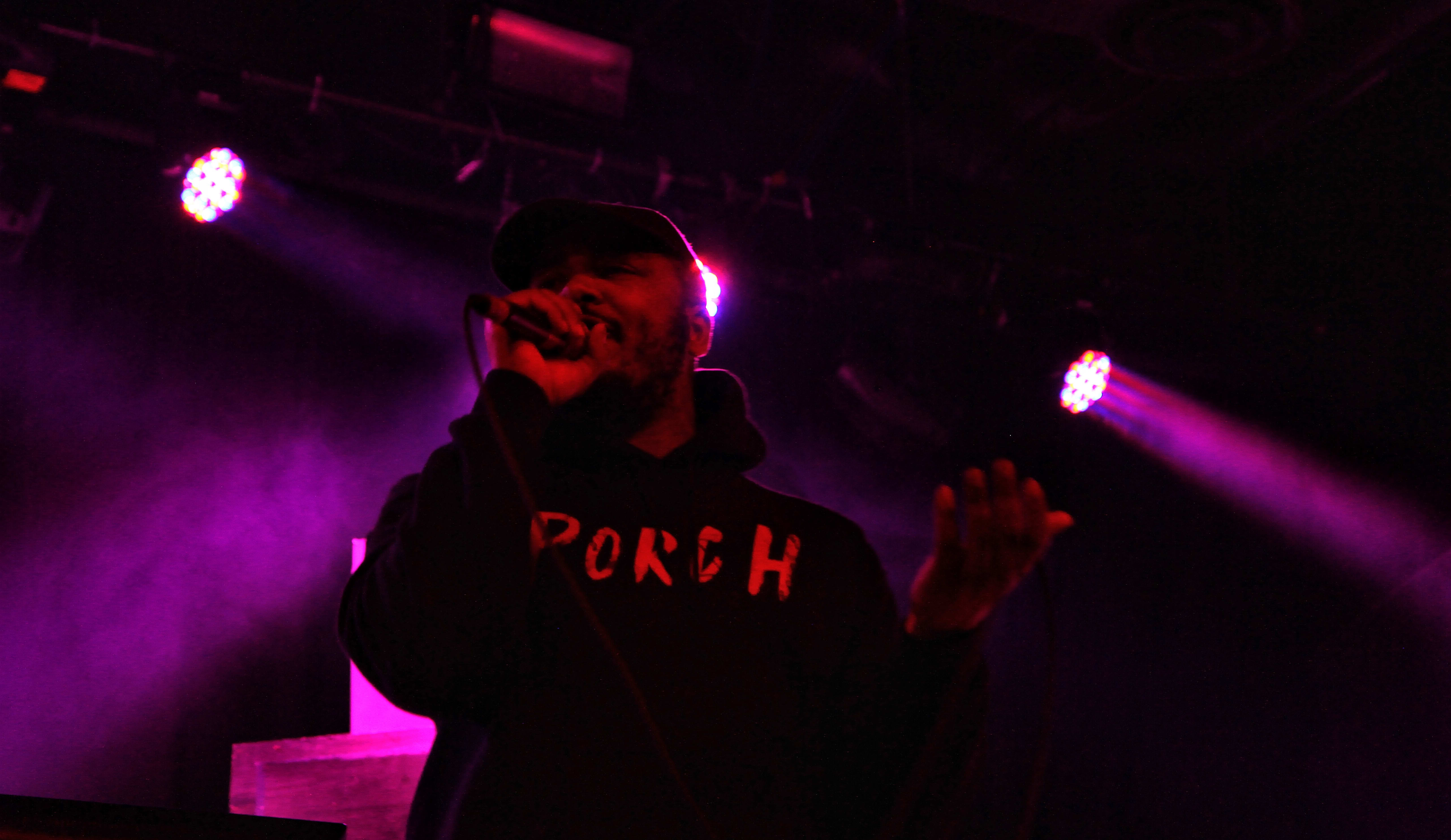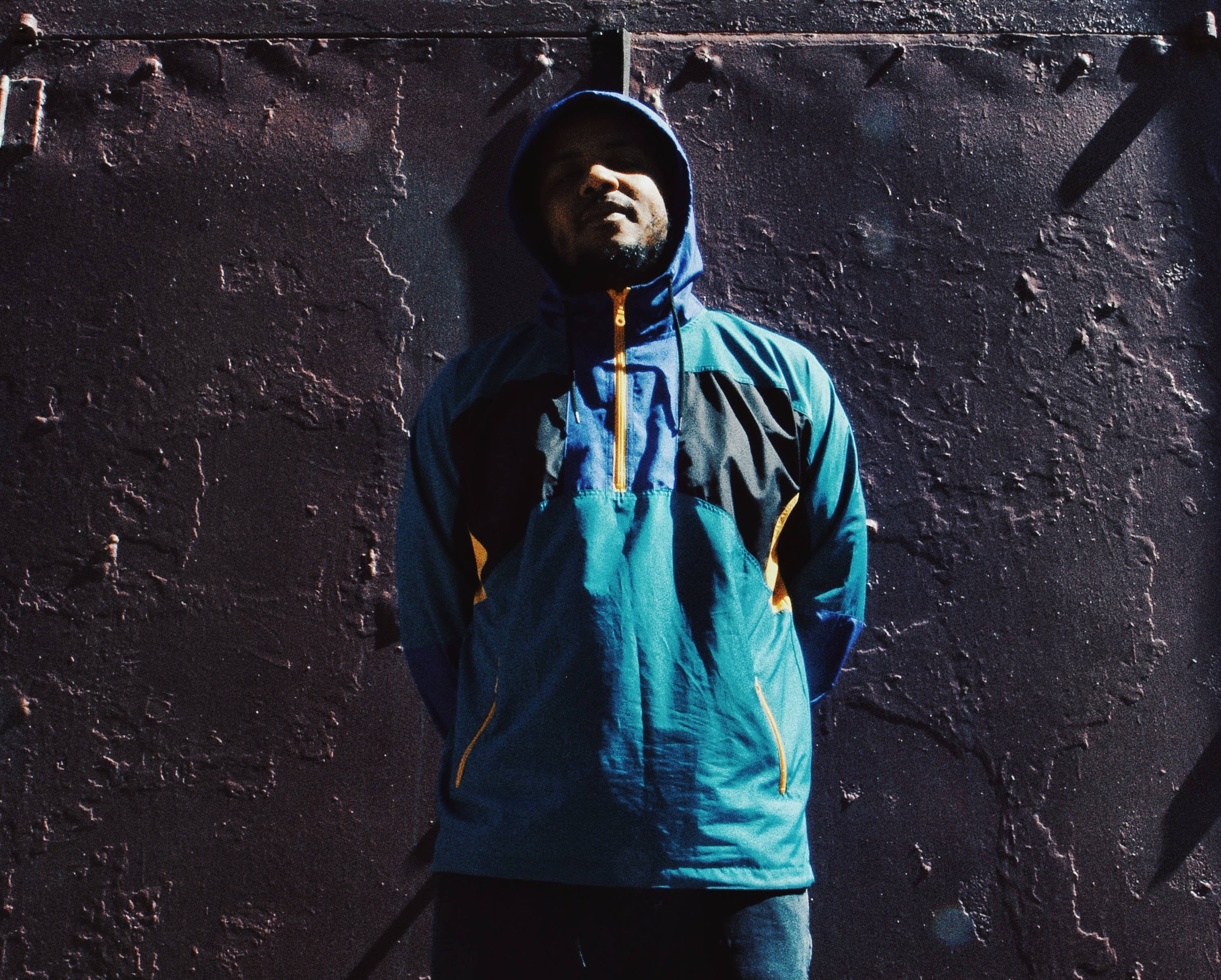
Before I interviewed GRIP, we spoke about the early stages of media attention for an artist. I told him that from what I’ve seen, the media always runs with the most exciting narrative. 50 Cent got shot 9 times, Bon Iver escaped into the wilderness, Lil Pump dropped out of Harvard. I told him that he should think about what he wants that narrative to be before the media determines it for him.
In past decades, these stories were sensationalized simply because we didn’t have all the information that we needed to know better. These days, we have too much information, but we still choose to sensationalize everything with hyperbole, exaggeration, and thinly veiled social media fronting. Even in the age of oversharing, we choose very carefully how to present our lives.
GRIP doesn’t share much, at least not yet. He’s twenty-something with a daughter and a nine-to-five that he’s ready to quit when music brings in enough money. He’s an extremely talented rapper and storyteller, and he cares deeply about making music with substance, music that genuinely reflects the environment he’s living in and the world he sees. GRIP could stand for maintaining a strong grasp on reality, but he admits that it’s really just a nickname from back in the day, and it stuck.
Based on the Atlanta rapper’s album PORCH, a concept project revolving around the Southern fixture that has come to represent different things to different people, it’s a safe bet that there are many stories that GRIP could offer to present an exciting version of the fascinating new superhero rapper you need to know right now. But GRIP isn’t trying to let his introduction be reduced to a story, and he's not trying to be a superhero.
“I feel like a lot of the time, the fact that it’s a business, the people who are packaging and selling the product don’t identify with the person—it’s just about a story,” he says. “Everyone’s different, but everyone’s normal… I struggled when I was growing up, and I rap good. And I’m just trying to goddamn make a way…. I’m just a regular person. I’m normal, and I want to be able to relate to everybody, and I want everybody to be able to relate to me.”
The funny thing is, GRIP’s desire to portray himself as a normal, relatable person is exactly what makes him different. Well, that and the fact that he's good at rapping. Really good.
Meet GRIP.
I’ve played PORCH for a lot of people now, and one of the main reactions is people are surprised you’re from Atlanta. Do you get that a lot?
Yeah, I do.
Why do you think that is?
I think it’s because the sound of the music right now. The sound of the music and the fact that when people think of Atlanta they think of a country accent or something like that. But I think more so it’s the actual sound of the music.
Where did your sound come from?
I’ve always listened to all types of music, but I think it comes from my preference. I can do everything, but I feel like I’ve got to stand out somehow. That’s how I’ve stood out so far. People will say, “Oh, it don’t sound like Atlanta.” If I think of what Atlanta sounds like right now, I guess the Migos sound like Atlanta, and of course I don’t sound like that.
Do you enjoy Migos and other current music like that?
I listen to it. I think music is for moods, so depending on what mood I’m in or what mood I want to be in, I’ll play whatever. I play all types of music. I don’t knock none of the shit, I like it all.
Right now, being yourself is taboo. All of these trends—that’s not being yourself, that’s people copying something that they’re seeing is popular
What kind of music did you grow up listening to?
Bro, T.I. is in my top five. He’s in my top five just for the influence he had on people from the South. He was one of the first lyricists from Atlanta, to me. Of course Outkast, you already know that. André 3000 is my favorite rapper. Let me see, Goodie Mob, Jay Z, Nas, people who had content in their music and was saying something and could tell a story. I also listened to rock, alternative rock when I was growing up. I don’t have the same background as Nirvana, but I can relate to the music. That’s how I look at it, and I want to tell stories that people with any background can relate to.
Can you talk a little about when you started making music? What inspired that?
I was always an artsy guy. I would go outside and stuff, but I would mainly sit at the table and draw, and I think that translated. I think I wrote my first rap in middle school, but I wasn’t rapping it out loud, I was just writing it down and getting my bars together and shit. But I’d say it was around the time T.I. dropped Trap Muzik was when I decided to get serious about it. It was Southern, and it was simplistic. Southerners have a simplistic style about them, so that kind of allowed me to take that and build my own style on it.
Were you calling yourself GRIP back then?
Yeah, yeah. GRIP was my first name. It was on some high school shit. We all had our little cliques, and my clique was the Kodak Boys—don’t laugh. We pulled the girls and all that shit, so we were kinda cool, so you know, the Kodak Boys.
Can you break down the name GRIP? What meaning does that have for you?
I ain’t even the type of person to try to think of an acronym for the name. It could mean a lot of things, but that just came around from school and it just stuck with me. Originally it was money—you know, Big Money Grip or some shit like that, but it really just ended up as Grip. But I think now, with my music being so based on reality, it’s more like “get a grip” because my music is so reality-based. But there’s really no special meaning behind it. It’s just a name that stuck with me.
If I don’t have anything to write about, I’m not gonna just jump in there like, “I fuck your bitch in the coup.”
The other thing that I think people take away from your music is that it’s really smart, and it sounds like you map everything out ahead of time. Do you, or do you think a lot of this stuff on the spot?
I’ll go through droughts. If I don’t have anything to write about, I’m not gonna just jump in there like [raps in triplet flow], “I fuck your bitch in the coup.” When it comes to my projects, I like to sit back and think about what I want to say and how I can execute it, because it’s a challenge to me, and I like a challenge. So I’ll sit back and I’ll plan it, think about what sound I want, and a lot of the times I’ll write without a beat. And then when I think of what sound I want for the project, I’ll go with it and take it from there.
What do you look for in production? Is there a certain type of beat?
As soon as I hear it, I know. Sometimes it’s soul, but my shit always slaps. I like bass, but of course I like soul too, because I’m from the South. Just something you can catch a flow to. Within the first three seconds, I already know if I like a beat or not.
So you have your raps, and then you hear the beat. Do you then make up the delivery around the beat?
Yeah, sometimes I already have something, like the cadences or the tempo. The first thing that comes to mind will most likely be the hook. Like “Culdesac,” for instance. When I first heard “Culdesac,” the producer Ahyes was saying something totally different. But I was tuning that shit out, because I’ve already got it in my head. Deh-deh-deh, deh-deh-deh, deh-deh-deh, then “Culdesac” came about. Matter of fact, the first thing I said might’ve been “culdesac, culdesac, culdesac,” and then I just started fitting everything else in.
Can you talk a little about the theme of PORCH? I don’t want to call it a concept album, but it seems like there are some common threads that run through it.
Yeah, so really it is a concept. Originally, it was going to be a day, but I didn’t want to do that because I already knew people were going to automatically compare it to good kid, M.A.A.D City. But that was one of the things that I always wanted to do. I like concepts. So with PORCH, I wanted to speak on the times, so when you go back 20 years from now, you know what time it was from the music. Not the sound of the music, but my content. I’m talking about police killing blacks and other social issues of the time.
What PORCH is all about is a black man from three different perspectives. A porch is a staple, especially in the South, for people in the hood, and for people, period. Everyone sits out on the porch. There’s the perspective from the time you were a kid, so songs like “All On You,” where I’m talking about being innocent, before you jump off the porch, but you’re starting to see things already. On “All On You” I talk about how I would go to this Korean convenience store, and eventually it got robbed and the mother got killed. It was two people, they didn’t even get too much money, but it showed me a lot, like damn, it’s kind of fucked up out here. And the names were going around the neighborhood, but you knew you just couldn’t say shit. So you got the young’uns perspective, which was the innocence.
Then you have the perspective as a teenager, when you’re jumping off the porch, like “Liq & Licks” and “Maintainin’.” That’s just like you and the homies are teenagers, getting into some shit, becoming a product of your environment. And then you have the third perspective. That’s growing up and looking back on the silly shit and seeing how everyone’s affected by what goes on—“King’s Nightmares,” “Portraits,” “Jail Pose.” It’s those three perspectives, so I guess you can call it somewhat of a concept album, and conceptually it all revolves around the porch.
It was really scare tactics, like, “Alright, ya’ll n****s have come far, but y’all ain’t really come too far. We still run this shit.”
You talk a lot about the things you saw growing up. What was your childhood like?
As a kid, we ain’t really have too much. I grew up in my grandma’s house, and it wasn’t in the nicest area. But I had my cousin, we were a month apart. I was always smart, but we were in the hood, so we’d get into shit. As you grow up and you get to middle school, and all that other shit starts mattering—popularity, girls, clothes. It will start to corrupt you, man.
I ended up moving in with my mom, and we lived in Stone Mountain—I call it black suburbia. It’s considered the suburbs, but it’s mainly black, so you still have the same conflicts and all that shit you have in the hood because you’re still surrounded by the same type of people with the same mindset. When you get out there, it’s working class parents and shit. My mom and her boyfriend just always struggled with money. We wouldn’t have lights sometimes. Nobody else’s shit was like that, but our shit was. Sometimes we wouldn’t have lights, water, whatever. The electricity or the heat would be off or some shit, so I’d go over to my homie’s house. We were getting evicted, cars getting repo'd, we’d have to go back to my grandma’s house or my auntie’s house to take showers.
That was just my mom not having enough, and just poor money management. That just comes from generations and generations of not having shit. That switch never came, and we struggled. But I finished high school, then got kicked out of college—not even after a full semester of college I got caught selling dope. So I came back, and just really tried making shit happen with the music.
Going back a little, you talked about wanting people to know the times you’re in when they hear your music. Where does that come from? I’ve heard Nina Simone say something like that…
Yeah, Nina Simone and James Baldwin. That was a quote that stuck with me. Nobody is talking about shit, and it’s just crazy. I’ve got a kid, and it’s crazy that your kid can leave the house and you can fear for their life. You can fear that they might not make it back because of their skin color, and I really feel like those are scare tactics. We saw over 20 black people killed by police, and we’d see it on our phones, we’d see it on the TV. It was really scare tactics, like, “Alright, ya’ll n****s have come far, but y’all ain’t really come too far. We still run this shit.”
I wanted to speak on that shit. Of course, it’s not the coolest thing all the time. Nowadays music is so trendy—if it has a nice bassline or a repetitive hook, then you’ve got a hit. I could do that easily, but I wanted to speak on something that’s bigger than me, so somebody 10 or 20 years from now can say, “Oh yeah, that shit is straight, but this shit’s a classic.”
Do you plan on rapping for a long time? A lot of young rappers now are like, “I don’t wanna be rapping when I’m 25 years old.” Do you think about that?
Yeah, it depends on where it takes me. I’m sure Jay-Z didn’t originally say, “Yeah, I wanna be rapping when I’m 48.” But he just released one of the best albums of his career. It’s one of the top five Jay-Z albums to me. So it depends. I could be Jay-Z, or I could be André 3000, who you’ll probably never hear an album from again. Wherever it takes me, as long as I leave a legacy.
I call it auto-pilot. Any time I’m on stage, I don’t have to think about what I’m going to do.
What do you think about the overall state of hip-hop right now?
It depends on what standpoint we’re talking from. As far as content goes, it’s a love/hate thing. I hear people say, “Oh, I’m trying to listen to something catchy right now, I’m not trying to think.” It’s like, what? Music is the connection between everybody. As far as business, it’s as lucrative as it’s ever been. I’m talking about right now, a 17-year-old can get rich off of just saying anything, you know? But as far as content, I think it lacks. It’s to the point where if someone comes out and says something of substance, they’re gonna compare you to this one person. But if someone comes out and sounds like Future, there’s plenty of other artists you can compare them to.
I feel like rap is going to become the biggest genre of music, so that’s great for hip-hop and for the love of what it is. It’s in a great place, but as far as content and the mindsets of people getting younger and younger, I think we’re setting it up to have a quick shelf-life. When somebody is 30 and has grown up, they’re not gonna go back and listen to certain shit that they were listening to when they were 15. We’re setting it up so you can get in, get it while you can, and get out. That’s where it is, but I have faith that there’s always going to be young kids and older people who are going to relate to the shit that has a message.
What is Stray Society, the collective you're a part of?
Stray Society is pretty much being yourself, man. Right now, being yourself is taboo. All of these trends—that’s not being yourself, that’s people copying something that they’re seeing is popular. Stray is going against the grain, and in today’s society, being yourself is going against the grain. So come as you are, pretty much. There’s not many people doing that. I set it up for my fans and followers to feel a part of something. If you’re a fan of this shit, you’re a stray, just like us. That’s how I came up with the concept, and it stuck because I felt it.
With a lot of artists, there’s a difference between who they are as people and who they are as performers. Is that true with you?
I call it auto-pilot. Any time I’m on stage, I don’t have to think about what I’m going to do. When I do think, I’ll probably fuck up and skip a word or some shit. It comes natural to me. Of course in my everyday life, I’m not as hype as I am on stage, but I’m always myself.

What are your immediate goals? What do you want in 2018?
I’m going to drop more videos. I really want to open up on a nationwide tour. After 2018, I never want to have to clock in or do anything else but music. I want my income to come from music. From there, I’ll do anything I have to do.
What’s your take on social media? With a lot of artists, you can tell they’re made for social media and even if the music isn’t there, they’re so good at social media that they gain followers. It seems like your connection comes more from the music.
For me, growing up I couldn’t just click on my phone and see what my favorite artist was doing at the time. I think that was a good thing, because then whenever their music or interviews dropped it, it mattered. I feel like nowadays the artist is way too accessible. But it is what it is, there’s nothing you can do about that, you just gotta roll with the times.
Until I start to make moves and do shit, I’m not gonna be on social media every day. If I’m on tour or something, of course I wouldn’t have problems posting shit. But if I’m going to work, or going home, or going to pick up my daughter or something, n****s don’t want to see that shit. Once my shit really starts rolling, then I’ll go ahead and post.
What about long-term goals? Do you think about where you want to be in 10 years?
Yep. 10 years from now, I want to be in the top five, no questions. Right now when you’re talking top five you’ve got to throw Biggie or 2Pac in there, or Jay-Z and Nas. I want to be there. If not worldwide, definitely among Southern artists or Atlanta artists. By that time, man, I want to be established to the point where I can speak to the people, touch the people. I want to sell out arenas and sign more artists to Stray Society. I want to leave my mark and be considered a legend.
What do you have coming up? You told me a little about the project you have coming up, do you want to talk about that?
Oh yeah, Snubnose. I guess we’d call this another concept project. A snubnose is a revolver, a .38. A .38 holds six shots, so it’s going to be a six-song EP speaking on the revolving nature of the hood and the shit that goes on. It’s going to sound way different than PORCH. Ahyes produced the whole thing, but after that it won’t just be him. I know there’s a particular sound he comes with, and I want my fans to hear me on other shit.
Anything else you want to say?
I remember you sent an email basically asking, “What’s your story?” I feel like a lot of the time, given the fact that it’s a business, the people who are packaging and selling the product don’t identify with the person—it’s just about a story. Everyone’s different, but everyone’s normal. Of course 50 Cent got shot nine times, and he’s got a story behind it, but some people just struggled. I struggled when I was growing up, and I rap good. And I’m just trying to goddamn make a way. It’s not always a narrative, and I think that’s the biggest thing we need to focus on in music, because we’re always worried about how to package it. I’m just a regular person. I’m normal, and I want to be able to relate to everybody, and I want everybody to be able to relate to me.

